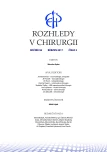-
Medical journals
- Career
Left hepatic vein injury during laparoscopic fundoplication for giant paraoesophageal hiatal hernia
Authors: S. Czudek 1,2,3; M. Lerch 1,2; P. Ostruszka 1; P. Zonča 1,2; J. Dzielicki 3
Authors‘ workplace: Chirurgická klinika FN Ostrava přednosta: doc. MUDr. P. Zonča, Ph. D., FRCS 1; LF Ostravské univerzity v Ostravě pověřen vedením: prof. MUDr. P. Dítě., DrSc. 2; Akademickie Centrum Chirurgii Maloinwazyjnej Zabrze, Polska přednosta: prof. Dr. n. med. J. Dzielicki 3
Published in: Rozhl. Chir., 2017, roč. 96, č. 3, s. 134-137.
Category: Case Report
Overview
Introduction:
After laparoscopic cholecystectomy, laparoscopic fundoplication has become another gold standard of minimal invasive surgery. The level of satisfaction of patients undergoing endoscopic surgery is almost 90%. Laparoscopic fundoplication, like other surgery methods, can also be burdened with grave complications, which could result in a fatal outcome even if the surgery is performed by a skilled surgeon. Even the authors themselves encounter complications despite their rich experience (more than 3,500 laparoscopic operations in the diaphragmatic hiatus area in more than 20 years).Case report:
The authors report on a rare left hepatic vein injury during laparoscopic hiatoplasty and fundoplication according to Toupet for giant paraoesophageal hiatal hernia.Conclusion:
For its low percentage of complications, laparoscopic fundoplication is considered as a safe operative method for gastroesophageal reflux disease and hiatal hernias. However, severe complications may still arise during the surgery and the surgeon should be familiar with them, be prepared for them and be able to manage such complications.Key words:
gastroesophageal reflux disease − hiatal hernia − laparoscopic fundoplication − left hepatic vein
Sources
1. Kohn GP, Price RR, DeMeester SR, et al. Guidelines for the management of hiatal hernia. Surg Endosc 2013;27 : 4409−28.
2. Anvari M, Allen C. Laparoscopic Nissen fundoplication: Two-year comprehensive follow-up of a technique of minimal paraesophageal dissection. Ann Surg 1998;227 : 25−32.
3. Jones R, Canal DF, Inman MM, et al. Laparoscopic fundoplication: A three-year review. Am Surg 1996;62 : 632−6.
4. Kala Z. a kol. Refluxní choroba jícnu. Praha, Grada Publishing 2003;44−5.
5. Kala Z. a kol. Refluxní choroba jícnu. Praha, Grada Publishing 2003;49−50.
6. Watson DI, de Beaux AC. Complications of laparoscopic antireflux surgery. Surg Endosc 2001;15 : 344−52.
7. Freeman RK, Van Woerkom JM, et al. Esophageal stent placement for the treatment of iatrogenic intrathoracic esophageal perforation. A Thor Surg 2007;6 : 2003–8.
8. Kala Z. a kol. Refluxní choroba jícnu. Praha, Grada Publishing 2003;83−5.
9. Leggett PL, Bissell CD. Aortic injury during laparoscopic fundoplication. Surg Endosc 2002;16 : 362.
10. McKenzie T, Esmore D, Tulloh B. Haemorrhage from aortic wall granuloma following laparoscopic Nissen fundoplication. Aust N Z J Surg. 1997;67 : 815−6.
11. Baigrie RJ, Watson DI, Game PA, et al. Vascular perils during laparoscopic dissection of the oesophageal hiatus. Br J Surg 1997;84 : 556−7.
12. Nagpal AP, Soni H, Haribhakti SP. Left hepatic vein injury during laparoscopic antireflux surgery for large para-oesophageal hiatus hernia. J Min Acces Surg 2009;5 : 72−4.
13. Lazarus B, Chen Y, Wilson FP, et al. Proton pump inhibitor use and the risk of chronic kidney disease. JAMA Intern Med 2016;176 : 238−46.
14. Abraham NS. Proton pump inhibitors: potential adverse effects. Curr Opin Gastroenterol 2012;28 : 615−20.
15. Schoenfeld AJ, Grady D. Adverse effects associated with proton pump inhibitors. JAMA Intern Med 2016;176 : 172−4.
Labels
Surgery Orthopaedics Trauma surgery
Article was published inPerspectives in Surgery

2017 Issue 3-
All articles in this issue
- Alarmins and surgical injury
- Complete minimally invasive Ivor-Lewis esophageal resection
- Laparoscopic diverting ileostomy in rectal cancer surgery
- Adherence to reporting guidelines in Perspectives in Surgery
- The risks of retroperitoneoscopic adrenalectomy
- Left hepatic vein injury during laparoscopic fundoplication for giant paraoesophageal hiatal hernia
- Wilkie’s syndrome – a rare cause of duodenal obstruction in an adult female patient
- Perspectives in Surgery
- Journal archive
- Current issue
- Online only
- About the journal
Most read in this issue- Wilkie’s syndrome – a rare cause of duodenal obstruction in an adult female patient
- Laparoscopic diverting ileostomy in rectal cancer surgery
- Complete minimally invasive Ivor-Lewis esophageal resection
- The risks of retroperitoneoscopic adrenalectomy
Login#ADS_BOTTOM_SCRIPTS#Forgotten passwordEnter the email address that you registered with. We will send you instructions on how to set a new password.
- Career

